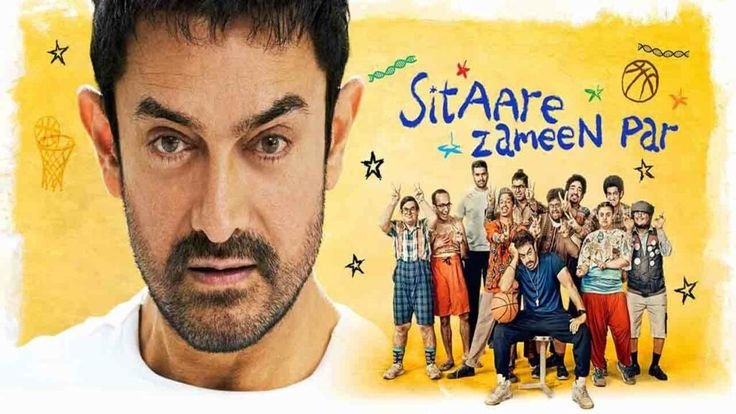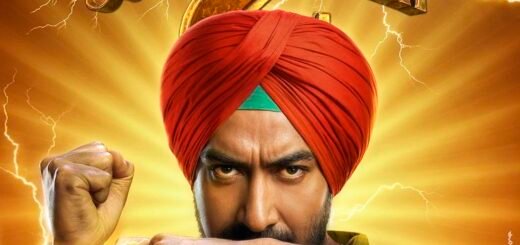Sitaare Zameen Par (2025): A Story That Radiates Hope

Aamir Khan chose his return to the big screen wisely. Sitaare Zameen Par does not simply entertain—it uplifts, informs, and challenges perceptions. After a three-year break following the lukewarm response to Laal Singh Chaddha, Aamir stepped back into the spotlight with a story close to the heart. Director R. S. Prasanna, known for sensitive storytelling, crafted a tale around inclusivity, second chances, and redemption.
Audiences welcomed this return warmly. Families, educators, and social activists flooded theaters on release day. Many left in tears, while others broke into spontaneous applause. The buzz extended beyond box offices and into social dialogue.
🧠 Plot Summary: Redemption On and Off the Court
Gulshan Arora, a once-celebrated basketball coach, spirals into alcoholism and emotional detachment after personal losses. When the court sentences him to community service following a drunk driving incident, Gulshan lands at a shelter for people with disabilities. The shelter director hands him a task he neither wants nor believes in: train a team of ten individuals, each with a unique intellectual or physical disability, for an upcoming sports championship.
Initially, Gulshan rejects them—mocking their abilities and making no effort to connect. However, as the story unfolds, he begins to see them not as “special” but as gifted, funny, resilient individuals. These young adults, each played by real people with disabilities, surprise Gulshan with their grit. They test him, confront his arrogance, and slowly melt the ice around his heart.
Sameera, played by Genelia D’Souza, supports Gulshan’s journey with quiet strength. She challenges his prejudices and stands firm when he falters. Her presence anchors the emotional core of the film.
By the final match, Gulshan doesn’t merely coach a team. He defends a family. His redemption no longer rests on winning—it lies in proving the world wrong about who deserves a seat on the podium.
🎭 Performances: Heartfelt, Groundbreaking, and Unforgettable
Aamir Khan chose complexity over comfort. His portrayal of Gulshan refuses to chase sympathy. Instead, he embraces the character’s flaws—his bitterness, his guilt, his refusal to feel. Through each scene, he strips away layers until the audience sees a man learning how to heal.
Genelia D’Souza returns with grace. She brings Sameera to life with poise, creating a character who never begs for screen time but commands attention. She uplifts Gulshan without becoming a prop in his journey.
The true stars of the film—the ten actors with disabilities—carry the story with staggering authenticity. They laugh, stumble, joke, cry, and win with no dramatic filter. They own the court with raw energy. Every viewer feels their triumphs and setbacks personally.
One standout moment involves a player with autism sinking a crucial basket after a full quarter of silence and struggle. The theater erupted during this scene. People did not clap for the performance—they clapped for the truth it delivered.
🎬 Direction and Writing: Compassion Without Pretense
R. S. Prasanna never reduced the film to charity or pity. He focused on strength—of character, of will, and of unity. He treated disability not as a problem to be solved but as a reality to be embraced. His direction carried empathy without sentimentality.
The script, penned by Divy Nidhi Sharma, drew inspiration from the Spanish film Champions but localized every emotion. Sharma replaced western humor with Indian warmth and regional references. She allowed each character to evolve, even minor ones. No one existed to fill a stereotype.
🎵 Music, Cinematography & Editing: Emotional Harmony
Shankar–Ehsaan–Loy composed a gentle, uplifting soundtrack. The songs avoided flashy beats and instead supported the emotional pacing. “Udaan,” the central anthem, soared with inspiration. “Chhoti Chhoti Baatein” carried quiet introspection that resonated with viewers long after the credits rolled.
Cinematographer G. Srinivas Reddy framed the basketball scenes with a delicate mix of chaos and symmetry. He captured group dynamics without losing focus on individual journeys. The court scenes glowed with energy, while shelter shots brought softness.
Editor Charu Shree Roy trimmed the runtime to 158 minutes. While the second half dragged slightly, especially in the training montages, the rhythm never lost emotional grip. With just a few snips, the final act could have become even tighter.
🎟️ Audience Reaction: Roars, Tears, and Reflection
Audiences across India lined up for early shows. Families with children, therapists, school teachers, and activists showed up in groups. Social media exploded with stories of viewers hugging strangers or sitting in silence long after the film ended.
Celebrities added to the emotional weight of the premiere. Juhi Chawla greeted Asha Bhosle with folded hands and tears in her eyes. Salman Khan, Shah Rukh Khan, and Vicky Kaushal joined the premiere night and praised Aamir’s courage in returning with a film that refuses formula.
NGO workers, school principals, and parents called the film “revolutionary” in its casting and message. They noted that Sitaare Zameen Par did what most textbooks still avoid—normalize disabilities without glorifying struggle.
💸 Box Office Performance: Modest Numbers, Major Impact
On its opening day, Sitaare Zameen Par collected ₹8.87 crore across India. Analysts projected it could cross ₹50 crore by the end of its opening weekend if the strong word-of-mouth holds. Screen occupancy touched 20% in key metro cities, with an even split between morning and evening shows.
While it may not shatter records like commercial blockbusters, the film has already achieved what matters—changing conversations. It drew real crowds, not just curious onlookers.
✅ Strengths and Areas for Growth
Strengths
- Honest, complex lead performance by Aamir Khan
- Authentic and groundbreaking debut performances
- Emotional depth without manipulation
- Direction rooted in empathy and strength
- Balanced narrative and social commentary
Could Improve
- Pacing in the second half
- Slight predictability in climax resolution
- Lack of a standout commercial song
🧭 Final Verdict: A Film With a Beating Heart
Sitaare Zameen Par does not scream for attention. It does not glamorize trauma. It sits you down, speaks softly, and leaves you thinking about people often forgotten by the system. Aamir Khan delivers a story that touches minds and hearts. R. S. Prasanna directs with rare clarity. The film makes you smile, cry, and reflect—often in the same scene.
Viewers left the theater not just entertained but changed.













